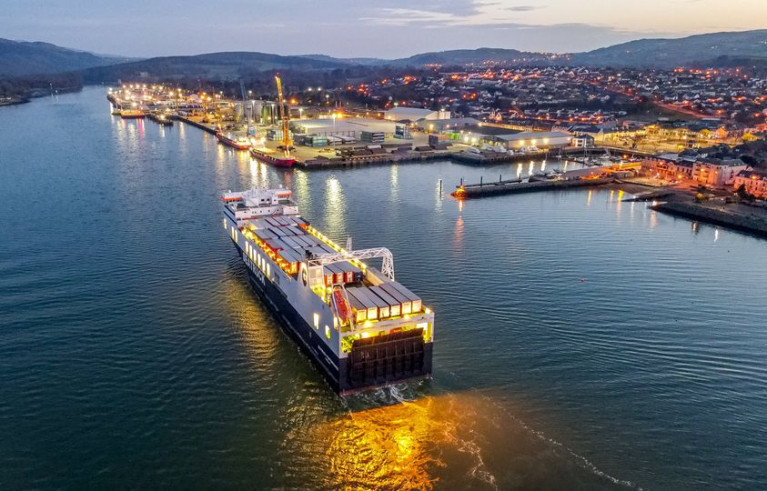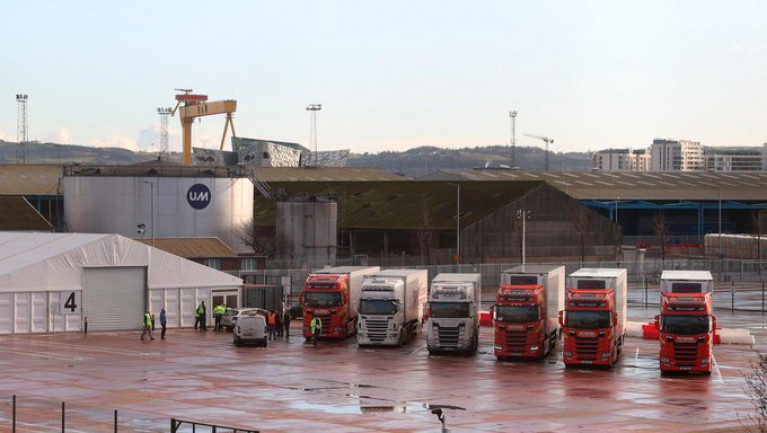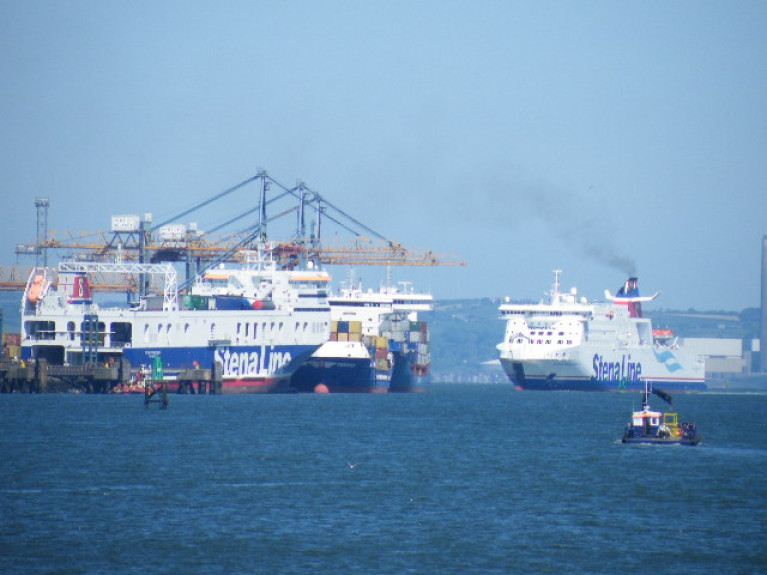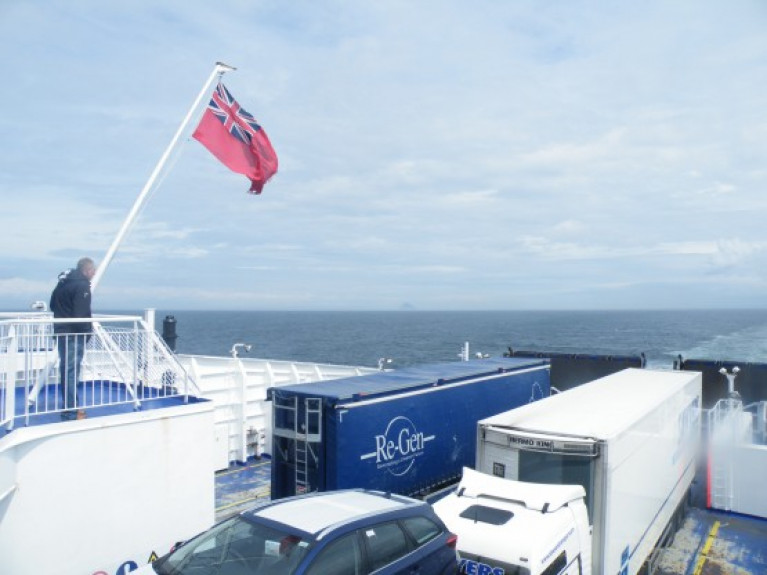Displaying items by tag: NI Protocal
New Northern Ireland Protocol Deal May See Lorry Traffic Rise Back to Ports in Republic, says Rosslare Europort
Following the Windsor Framework deal, new checks in Northern Ireland’s ports involving green and red lanes, may lead lorry freight traffic to be redirected back to ports within the Republic, has said the manager of Rosslare Europort.
The director of the Wexford ferryport, Glenn Carr told an Oireachtas Committee on European Union Affairs on Wednesday that it awaited the “good news” of Monday’s announced Windsor Framework deal.
The deal agreed between the UK and EU removes some checks at the ports in Northern Ireland. As for red-lane checks on EU-bound goods arriving from Britain, Mr Carr highlighted that he could see freight diverted back to ports in the south.
“More of an alignment with what happens with green line and red line in Dublin and Rosslare will now emerge with the protocol so that might bring some traffic back down,” said Mr Carr.
The Irish Times has more comments from the director at the port operated by Irish Rail /Iarnród Éireann. In addition to those of Barry O’Connell, the chief executive of Dublin Port Company who was appointed in recent months.
Windsor Framework: So What has Been Agreed in the New Brexit Trade Deal?
The United Kingdom and the European Union yesterday announced a much long-awaited new deal for post-Brexit trading arrangements for goods travelling from the GB entering Northern Ireland.
The historic deal reached was in a bid to conclude a row that has overshadowed ties between Britain and the EU since Brexit took place with the Withdrawal Agreement Act implemented in January 2020.
The Windsor Framework deal seeks to resolve tensions caused by the Northern Ireland Protocol, a complex agreement which set trading rules for Northern Ireland that London agreed before it left the EU but now says are unworkable.
As RTE News reports, below are the key components of the Windsor Framework as outlined by British Prime Minister Rishi Sunak and the European Commission President Ursula von der Leyen:
Green and Red lanes
When the UK left as member state of the EU, the then prime minister, Boris Johnson had agreed to a deal that effectively left Northern Ireland within the EU bloc's single market for goods because of its open border with the Republic of Ireland. This therefore creating a customs border with Britain.
Prior to yesterday’s agreement, the UK government had wanted to reduce the number of checks carried out on goods travelling across the Irish Sea from Britain to Northern Ireland.
Under the terms of the Windsor Framework, both sides have reached an agreement to separate goods just going to Northern Ireland, whereas those bound for the Republic of Ireland will go into "green" and "red" lanes.
The new trading procedures is designed to reduce the amount of paperwork that face companies, as they said they were unable to provide a full range of products entering Northern Ireland. The reason, cited companies was due to the numerous port control checks which became too onerous.
RTE News has more on the major agreement reached following the political impasse of recent years.
The European Union has drafted legislation that aims to strengthen its hand in taking action against the UK over possible breaches of the Brexit Withdrawal Agreement and EU-UK trade deal.
It comes after the UK published legislation to give ministers powers to override elements of the Northern Ireland Protocol.
Fine Gael MEP for Ireland South Sean Kelly has been appointed lead author in finalising the draft legislation, which looks at the measures contained in the post-Brexit trade deal on what retaliatory action can be taken if one side does not adhere to its obligations.
"So basically, we will put on the table the steps that will be taken if they continue down this path, and giving the opportunity to the Commission on how to do it," he said.
More reports RTE News on developments.
Business Chiefs Welcome Delay Over Increased Checks at NI Ports
Northern Ireland business leaders have welcomed another delay on increased checks on certain goods crossing the Irish Sea, but are urging the UK and EU to strike a comprehensive long-term deal.
As Brexit Minister Lord Frost announced an indefinite delay on checks on goods, including chilled meats and medicines, arriving here from Great Britain, the Ulster Unionist leader Doug Beattie has come under attack after proposing an all-Ireland body to help tackle issues around the Protocol.
The UUP yesterday launched a position paper on the Protocol, proposing a labelling system for products entering Northern Ireland from GB. Identifying products that will not be entering the Republic as “UK sale only” would be one way to reduce new Irish Sea checks, according to the party.
It also believes designating “free ports” would reduce duties and taxes and limit Brexit bureaucracy.
The Belfast Telegraph has further coverage.
Varadkar Says Ireland Expects the UK to Extend Brexit Grace Periods
According to RTE News, the Tánaiste has said Ireland expects Britain to announce further extensions to post-Brexit grace periods on goods imports into both Northern Ireland and into the rest of the United Kingdom.
Leo Varadkar said: "The expectation is that the United Kingdom will announce a further extension of the grace periods, not just in relation toNorthern Ireland but also imports from the EU and Ireland into the UK."
He was speaking following a meeting in London with Britain's cabinet office minister Michael Gove, who he said had told him that Britain "doesn't want to walk away from the protocol but does want to make it more workable."
Last week, Mr Varadkar said he would not object to grace periods delaying checks on some goods entering Northern Ireland being extended beyond the end of this month as part of efforts to resolve the dispute over the Northern Ireland Protocol.
More from the story here.
British Ministers to State Changes Sought to NI Protocol
Today the British government will set out a series of major changes it wants made to the Northern Ireland Protocol, the element of the Brexit trade agreement intended to avoid the return to a hard border on the island of Ireland.
The British minister with responsibility for relations with the EU, David Frost, has said that the protocol is not sustainable.
In a video call with Taoiseach Micheál Martin yesterday, Prime Minster Boris Johnson shared his ideas on how the protocol should be changed.
A statement to be made to the British House of Commons by Northern Ireland Secretary Brandon Lewis today, and in the House of Lords by Mr Frost, is expected to call for an end to virtually all checks on goods made in Britain intended for sale in Northern Ireland.
More on this RTE News story.































































